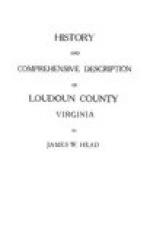Few of the early settlers of Loudoun enjoyed any other advantages of education than a few months’ attendance at primary schools as they existed in Virginia previous to the Revolution. But these advantages had been so well improved that nearly all of them were able to read and write a legible hand, and had acquired sufficient knowledge of arithmetic for the transaction of ordinary business. They were, in general, men of strong and penetrating minds and, clearly perceiving the numerous advantages which education confers, they early directed their attention to the establishment of schools. But for many years there were obstacles in addition to those incident to all new settlements, which prevented much being done for the cause of education. The controversies in which they were involved and the war of the Revolution employed nearly all their thoughts and all their energies previous to the State’s admission into the Federal Union.
Of the real efficiency of the Colonial schools of Loudoun but little can be learned. Teachers, as a rule, were on a par with their surroundings. If they could read, write and cipher to the “single rule of three” their educational qualifications were deemed sufficient. They generally canvassed the neighborhood with a subscription paper, forming the schools themselves and furnishing the few necessary books. The rates were from $1 to $2.50 per scholar by the month, and lower when the schoolmaster “boarded around.” But he was most likely to succeed in forming a school who contracted to take his pay in produce.
Few schools were taught by women in Colonial times and female teachers were still rare until a comparatively recent period.
The salaries of regularly appointed tutors varied according to the nature of the schools and the ability of the district to meet the expense.
After the Revolution, with increasing prosperity, came a spirit of general improvement and a new interest in the cause of education.
The present condition of education in Loudoun is hopeful, public instruction being now popular with all classes. Intelligence is more generally diffused than at any previous period of the County’s history, and happily, the progress of moral education has, on the whole, fully kept pace with intellectual culture. Our boys and girls are reared in a home atmosphere of purity, of active thought, and intelligent cultivation; all their powers are keenly stimulated by local and national prosperity and unrestricted freedom in all honest endeavor.
With the improvement in the school system has come a better style of school-houses. The “little red school-house on the hill” has given place to buildings of tasteful architecture, with modern improvements conducive to the comfort and health of the scholars, and the refining influences of neat surroundings is beginning to be understood. Separate schools are maintained for colored pupils and graded schools sustained at populous places.




